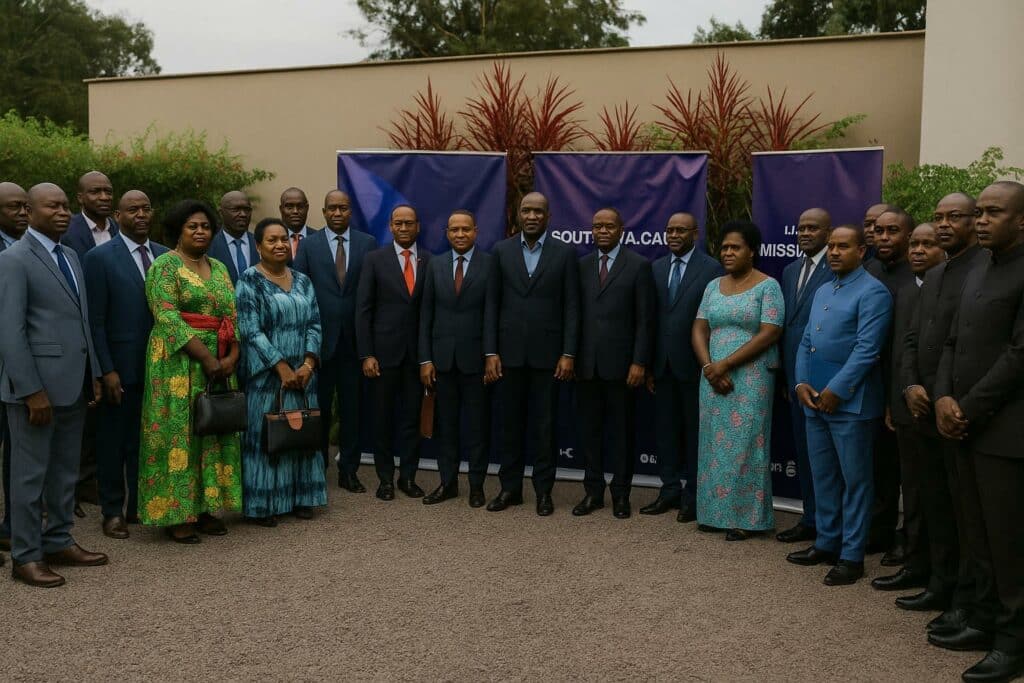Brazzaville Ceremony Launches a Continental Ambition
Late afternoon light bathed the conference hall in Brazzaville on 24 October as engineer Luc Missidimbanzi formally announced his candidacy for Secretary-General of the African Telecommunications Union (UAT) for the 2026 mandate. The gathering, conceived as a fund-raising moment for the forthcoming campaign, attracted an audience that blended senior government officials with innovators from the Republic of the Congo’s growing digital sector. Against this backdrop of national colours and discreet diplomatic protocol, the candidate drew applause while framing his run as an extension of a broader Congolese commitment to pan-African connectivity.
A Career Forged in Two Decades of Telecommunications Strategy
Missidimbanzi’s curriculum vitae is both technical and administrative. Trained as an engineer and currently serving within the Congolese public administration, he accumulates more than twenty years of strategic engagement in telecommunications. His fingerprints appear on several regional programmes—cited by the organisers as CAB, Osiane and Fasuce—that have shaped digital infrastructure across Central Africa. Colleagues frequently present him as a pragmatic actor adept at transforming policy aspirations into deployable solutions, an image the candidate himself cultivated by insisting that Africa already possesses “the human, technical and cultural resources required to become a sovereign, inclusive and solidaristic digital power.”
Four Pillars for African Digital Sovereignty
The heart of the Brazzaville address was a compact yet comprehensive programme structured around four priorities. First, universal access: the candidate advocates infrastructure capable of binding remote rural areas to urban data corridors, positioning connectivity as a fundamental right. Second, skills, innovation and inclusion: he envisages training hubs that place African youth at the centre of the digital economy. Third, regulatory co-operation: Missidimbanzi calls for harmonised continental frameworks able to facilitate cross-border services while respecting national specificities. Fourth, international leadership: he pledges an UAT that speaks with one voice in global standard-setting arenas, thereby converting African market weight into negotiating leverage. Each axis, he argued, will only reach maturity if the member states “unite around a shared vision to construct the continent’s digital future.”
Industry and State Close Ranks Behind the Bid
The endorsement of Bourgelie Ampion—chair of the Congo Telecom board and chief executive of Lexa International—illustrated the intertwining of public authority and private expertise that characterises Congolese digital policy. Praising the candidate’s patriotism and his long-standing investment in the training of young professionals, Ampion contended that a Missidimbanzi victory would consolidate Brazzaville’s standing in continental ICT governance. Throughout the evening several speakers echoed that sentiment, framing the campaign not merely as the ambition of a single individual but as an opportunity for Congo-Brazzaville to reinforce its contribution to a connected, autonomous Africa.
Key Takeaways
Beyond its ceremonial sheen, the launch crystallised three messages. The first is the ascendancy of digital sovereignty as a unifying narrative for African policymakers. The second is the emergence of seasoned technical figures able to bridge engineering know-how with diplomatic negotiation. The third is the growing expectation that the UAT, historically a technical coordination body, can evolve into a strategic instrument for regional autonomy. In situating his candidacy at this triple intersection, Missidimbanzi manoeuvres to embody both continuity and renewal within the organisation.
Legal and Economic Lens
From a governance standpoint, the candidate’s emphasis on regulatory convergence signals a potential acceleration of legislative alignment among member states, a process likely to influence spectrum allocation, data protection and market entry conditions. Economically, universal access, should it materialise, would widen the customer base for domestic operators and lower transaction costs for small businesses, reinforcing intra-African trade. The campaign thus resonates not only as a political contest but also as a prospective catalyst for normative and commercial integration.
Continental Vision, National Pride
As the ceremony concluded with a collective photograph, observers noted the symbolic resonance of a Congolese professional seeking to pilot an institution headquartered beyond his national borders. Missidimbanzi cast the moment in almost literary terms: connectivity, he said, must become both “the binding thread and the launch pad” for African ingenuity. Whether that rhetoric will translate into votes during the 2025 UAT election cycle remains, for now, unwritten. Yet the Brazzaville event underscored a certitude shared across the room: the digital chapter of African integration will be authored by Africans themselves, and the Republic of the Congo intends to hold the pen.

